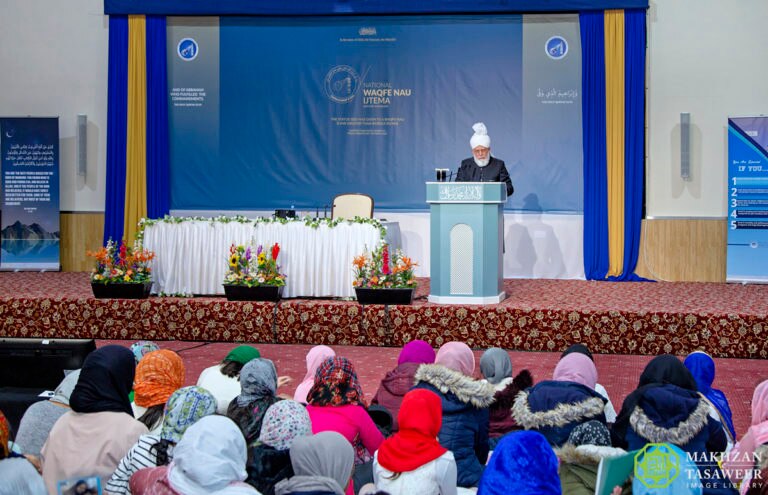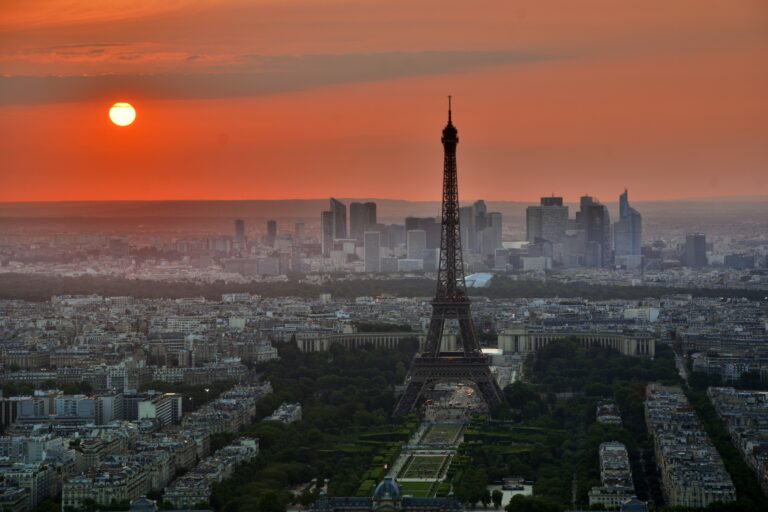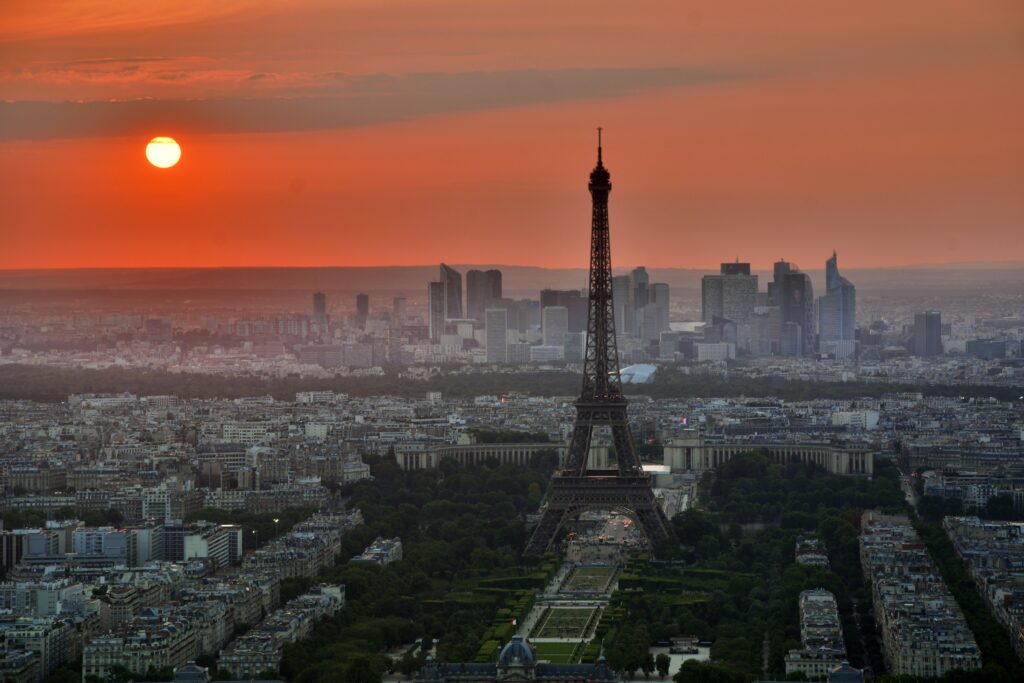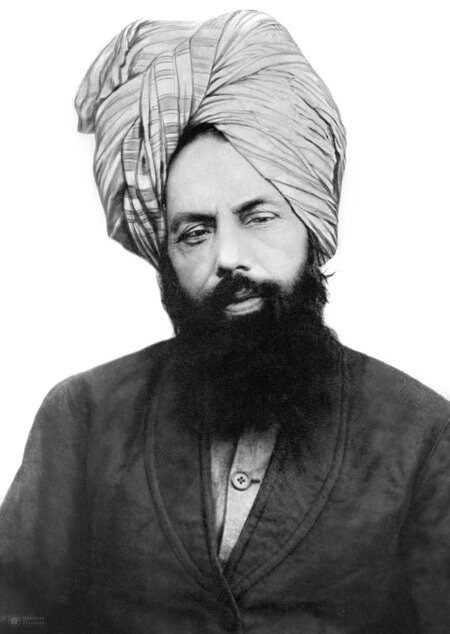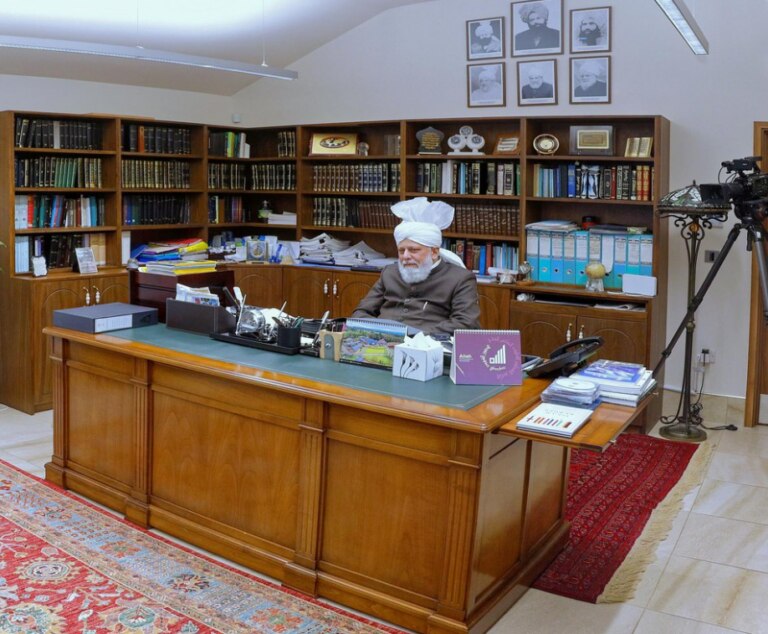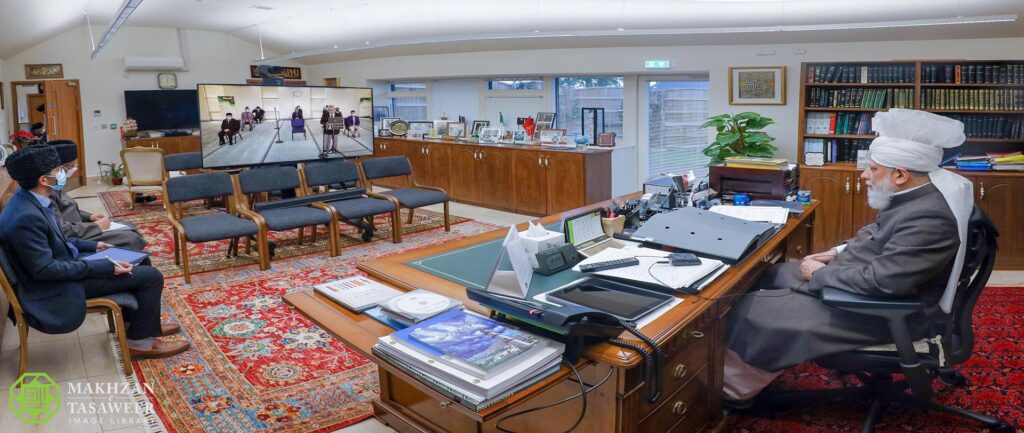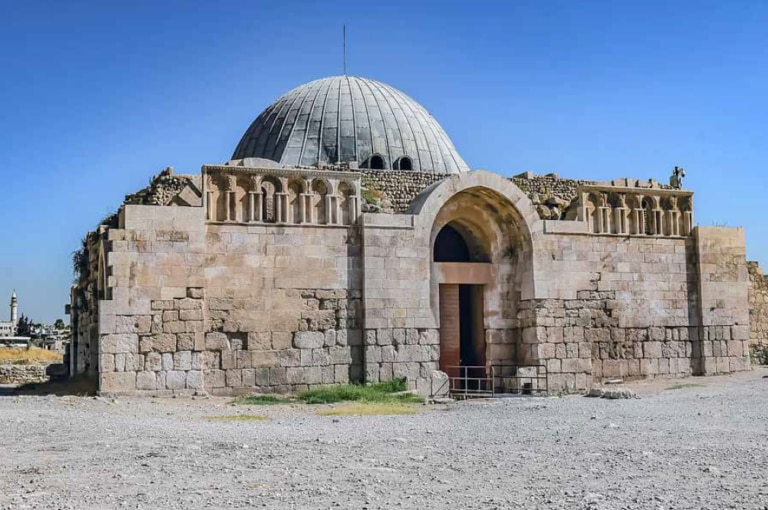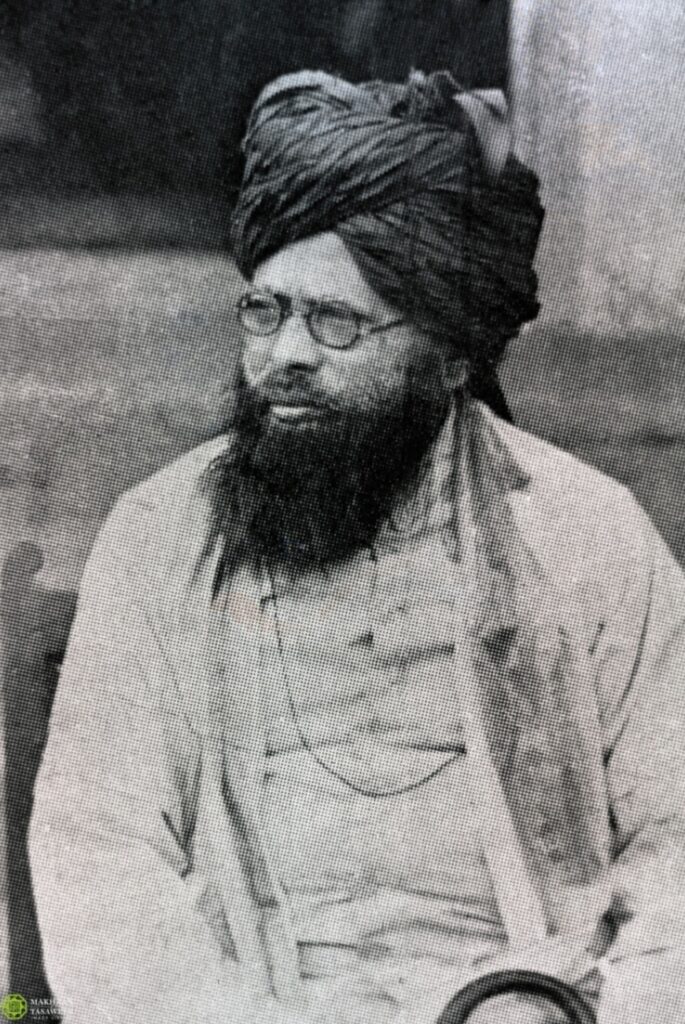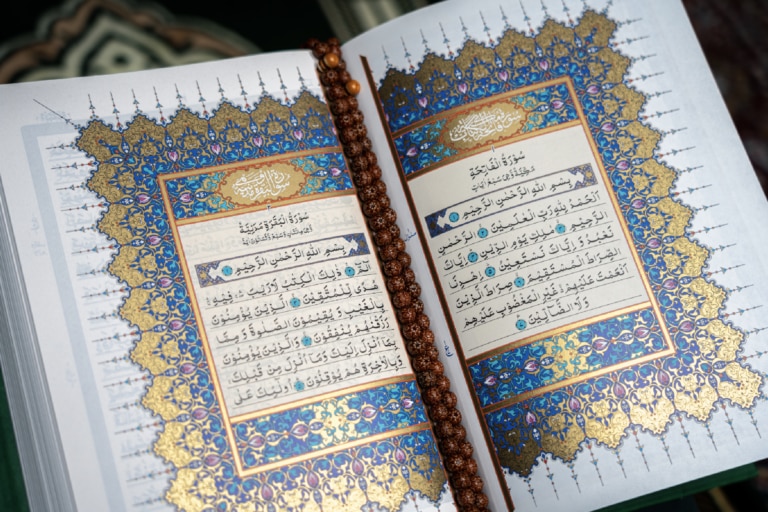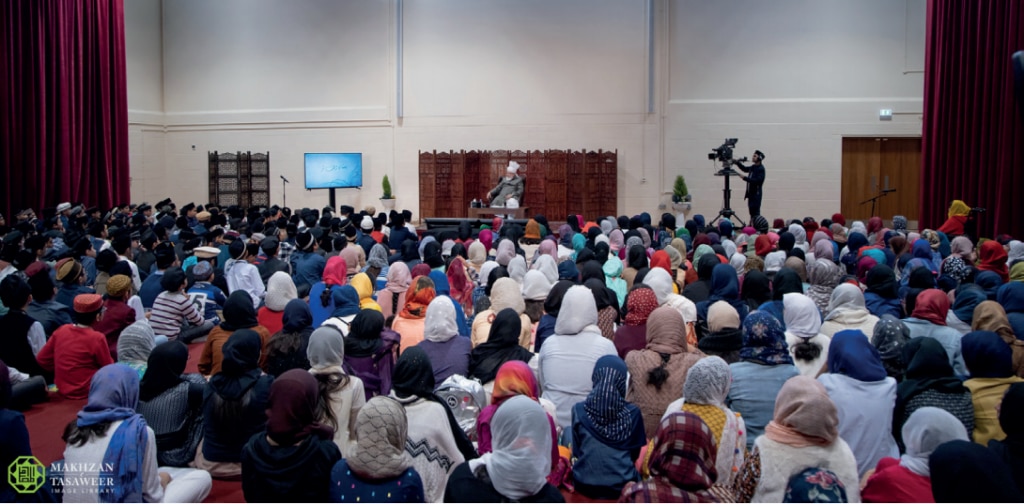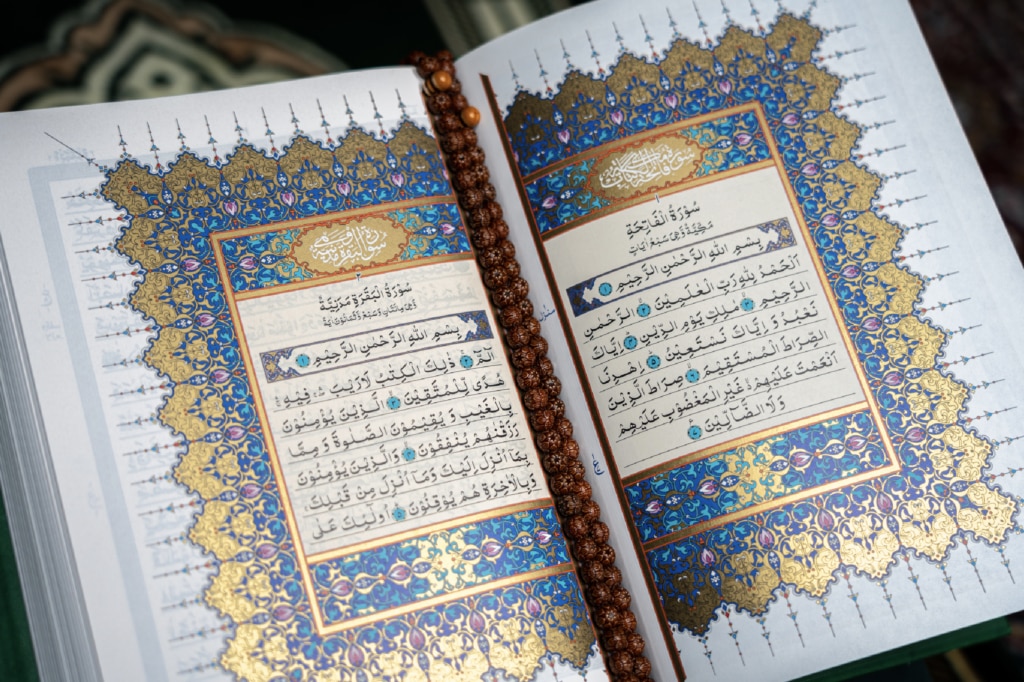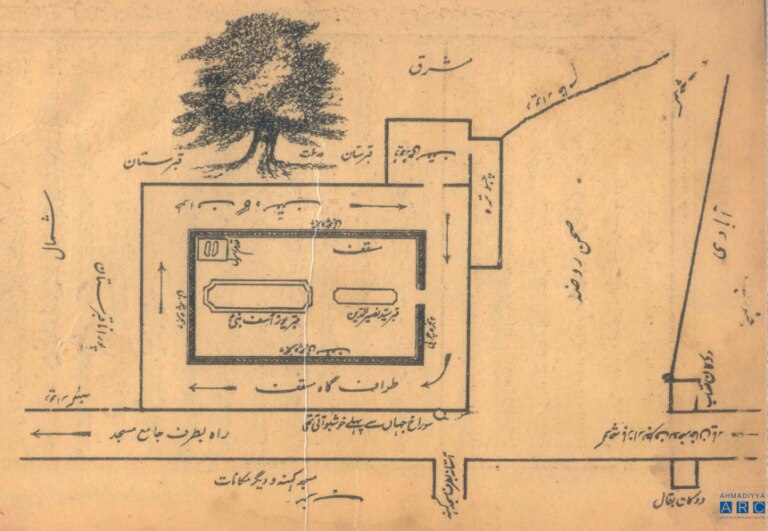Part I – Part II – Part III – Part IV – Part V – Part VI
Zafar Bhatti, UK
How Ahmadis have signed the proof of their Muslimness with their own blood
How Ahmadis have signed the proof of their Muslimness with their own blood Amongst the millions of graves in Pakistan, there is just one which belongs to a Nobel prize winner: the great Dr Abdus Salam, winner of the Nobel prize for physics in 1979, awarded for the unification of the electromagnetic and weak forces.
Yet, despite Salam’s stature in the world of science, his grave has become a poignant symbol of oppression and persecution. What stands out uniquely on his grave, even more than the acknowledgement of the Nobel Prize is that the word Muslim has been erased by the Pakistani authorities! The epitaph reads “In 1979 became the first Muslim Nobel laureate for his work in Physics”.
This symbolises the state backed persecution of Ahmadi Muslims in Pakistan; section 298-C of the Pakistan penal code makes it illegal for an Ahmadi to practice Islam and carries the maximum penalty of death – Maududi had finally got his wish:
“298-C. Any person of the Quadiani group or the Lahori group (who call themselves ‘Ahmadis’ or by any other name), who, directly or indirectly, poses himself as a Muslim, or calls, or refers to, his faith as Islam, or preaches or propagates his faith, or invites others to accept his faith, by words, either spoken or written, or by visible representations, or in any manner whatsoever outrages the religious feelings of Muslims, shall be punished with imprisonment of either description of a term which may extend to three years and shall also be liable to fine.”
This persecution of Ahmadi Muslims prompts the question that Evans attempts to answer: how do we Ahmadis prove our Muslimness? If only he had asked an Ahmadi Muslim the question he would have received a consistent answer. How has any persecuted community of God ever proven its own identity? If we look at the Christians at the time of Christ’s mission, if we look at the Muslims at the early persecution of the time of the Holy Prophet Muhammadsa, there is only one reaction to ongoing persecution that a community of God shows, which can be summarised in the following words of the New Testament:
“when you pray, go into your room, close the door and pray to your Father, who is unseen. Then your Father, who sees what is done in secret, will reward you”. (Matthew 6:6)
If we look at the Muslims at the time of Holy Prophetsa, they bore persecution upon persecution, cruelty upon cruelty with utmost patience. For example, we read of the slave, Bilalra, who was tortured by his master Umayyah in a most cruel and barbaric way. He “was made to lie on hot sand, loaded with stones, and boys were made to dance on his chest” (Life of Muhammad, p. 14) and then a noose was tied around his neck and he was dragged through the streets over sharp stones. His body dripping with blood, life draining from his body, Ummayah only wants him to say a few simple words of disbelief, but only one word escapes from his tongue “Ahad, Ahad”; “God is One, God is One”.
Eventually, at the point of death, a fellow Muslim is able to gain his liberty. We find similar examples today amongst the followers of the Messiahas of Muhammadsa, who came to revive the practice of that noble Prophet of Arabia and re-establish a group of people who would mirror the Companions of the Prophetsa, as had been prophesied in the Holy Quran:
“He it is Who has raised among the Unlettered [people] a Messenger from among themselves…and from among others who have not yet joined them.” (Surah al-Jumuah, Ch.62: V.4)
For example, we read of Danyal, a young Ahmadi Muslim missionary in Pakistan, only in his late twenties, recently married and father of a young daughter. One day, he returns home to find dozens of police crawling all over; his crime, being an Ahmadi Muslim missionary. He is arrested and taken to prison where he is subjected to continuous torture and abuse – torture that makes one’s blood curdle as if one was witnessing the re-enactment of a Stephen King movie. The torture begins by forcing him to stay awake, buckets of ice are poured over his head to keep him awake; at the same time, a torrent of verbal abuse is hurled at him and against the founder of Ahmadiyyat.
Eventually, after almost 60 hours of sleep deprivation, the torture takes on another twist; a thin stranger is brought into the room – he pleads for his life, pleading to Danyal to relent and betray his faith; Danyal refuses to relent, and then it begins – the police beat the young man to a pulp.
Danyal tries to look away, pleads and begs for mercy on behalf of the young man, but to no avail; he is forced to watch and the Police reply, “Stop? No, no, we cannot stop. You caused this, you hell-bound Qadiani!”
Danyal thinks about giving in, but the resolve of Bilal 1,300 years before gives him heart. The police have spotted a weakspot in his armour, the weak spot in every Ahmadi Muslim, the love for humanity. The following night, he is forced to stay awake again and is approaching 90 hours without sleep. He has begun hallucinating; another poor soul is brought in and a similar fate befalls him as Danyal is again forced to watch.
It’s the fifth night; over 100 hours of sleep deprivation have passed, but then the police’s depraved and twisted morality goes beyond even what Stephen King could conceive of; this time, they bring in a young woman, strip her clothes and begin to molest and rape her as Danyal is forced to watch.
Danyal is near breaking point, a pen and paper is placed in front of him – he just needs to write the words they need, but his heart cries out “Ahad, Ahad”. He does not break, so they break her – she crumples in front of him.
Finally, after six days of torture, his brother makes a successful appeal to free him. Like Bilalra before him Danyal remained firm to his belief; like Bilalra before him, he too signed the proof of his Muslimness with his own blood. (The Wrong Kind of Muslim, pp. 139-157)
Indeed there are only two proofs of belief which those persecuted in the way of God show: firstly, to spend the days under persecution and secondly, to spend the nights weeping tears in prostration to the beloved bearing witness to the verses of the Quran, “O ye who believe! seek help with patience and Prayer; surely, Allah is with the steadfast”. (Surah al-Baqarah, Ch.2: V.154)
Evans in his ethnographic study missed the glaringly obvious: Ahmadis do not need to offer any “counterfeit proof” of “Muslimness”. Their proof of Muslimness is signed with their very own blood and sealed with tears shed in remembrance of their Beloved, and whatever you may call that proof – it is certainly not counterfeit.
Ostentation and the Ahmadi Muslim
For an Ahmadi, “Muslimness” is internalised, not externalised. It is stated in the Holy Quran:
“You spend not but to seek the favour of Allah” (Surah al-Baqarah, Ch.2: V.73).
Hazrat Khalifatul Masih Vaa recently explained in a Friday Sermon:
“Sacrifices are granted acceptance by Allah the Almighty, on the condition that the sole intent of these sacrifices is to attain the pleasure of Allah the Almighty. If these sacrifices are merely for show, then such sacrifices are not accepted by Allah the Almighty. The sacrifice of those who present them merely for show are rejected and thrown back in their faces.” (Friday Sermon, 6November 2020)
Of course, anything internal will necessarily reflect the external, but we cannot call that ostentation or showing off, but just a natural manifestation of an inner quality; a flower exudes a fragrance and looks beautiful because it is just that, not because it pretends to be.
If Evans states that Ahmadi Muslims seem to be devoted to the Khalifa, that they hold peace symposiums, that they serve humanity, that they respond to opposition with peace and that they have a TV channel which incidentally is staffed by volunteers, all to prove their “Muslimness”, then it should be known that Ahmadi Muslims have not put on a façade or “counterfeitproof” to prove their “Muslimness”, but these actions are the natural consequences of being Muslim.
Mother Teresa said, “If you are kind, people may accuse you of ulterior motives. Be kind anyway”.
If Ahmadi Muslims felt the need to create an outward façade to prove their own Muslimness, then surely they would have adopted a method similar to those that other Muslims have: some who flail themselves with a whip in public to demonstrate their devotion, others who celebrate with great fanfare the birthday of the Prophetsa and yet, others who endeavour to copy what they believe to be the exact clothing and style of the Prophetsa – a beard of a certain length and clothing that is supposed to look like the clothing of the Arabs from early Islam.
The Holy Prophetsa stated in his last sermon to the Muslims, “The most honoured among you in the sight of God is the most righteous among you”. Any action that draws attention to oneself or is done for an outward display of piety, according to Islam, is not in conformity with the teachings of Islam.
Rather, Islam teaches a Muslim to be modest, humble and follow the example of the Noble Prophetsa, who, amongst a gathering, would often be mistaken by a newcomer as a follower rather than the Prophet; so humbly and modestly did he carry himself that the people could not distinguish him between his followers, often mistaking Abu Bakrra as the Prophet. Evans does acknowledge this difference in the appearance of Ahmadi Muslims, going so far as to say “Ahmadi men favor a dress code of shirts and pants, in such a way that they are not immediately identifiable as Muslim” (Far from the Caliph’s Gaze, p. 171).
But rather than acknowledging that this shows that Ahmadis are not interested in merely proving their Muslimness, he state, “In this sense, Ahmadis pride themselves on confounding misconceptions, on being unlike other Muslims – in short, on being exceptional”. (Ibid, p. 171)
In short, Evans states that Ahmadi Muslims prove their Muslimness by not showing their Muslimness – what a bizarre web of contradiction Evans weaves. Evans’ comments on an Ahmadi Muslims’ appearance actually reminds me of one of my first ever jobs after graduating.
I was fortunate to be accepted on the PwC Management Consulting Graduate scheme. During my first day in the office, the time for prayer arrived and being new at the company, I found nowhere to pray; I had no choice but to get out my prayer mat and pray in the open plan office, reputed to be the most expensive per square foot office space in London. My actions, as I had expected, would not go unnoticed.
A few months later on my first real assignment, my boss took me out for dinner. Whilst having dinner, my boss asked me words to the effect of, “You seem to be a devoted Muslim, for example I saw you pray in the office on your first day, and you leave the office to offer your prayers regularly during the day. Yet you do not dress like a practicing Muslim. So I don’t understand”.
I replied that “there is no specific style of dress that Islam specifies, apart from that it should be modest. As such, there is no reason for me to dress in a style which is different from the cultural norm here.
“With regard to prayer, these are compulsory and that first day I could not find anywhere to pray, so I had to pray in front of everyone.”
My boss understood the simple point – Islam is a pluralist religion. There are certain practices which are compulsory but there are others where Islam leaves the choices up to the individual as long as they fit within certain broad guidelines.
It was a simple answer that my boss understood; the prayer that day was certainly not a sign of me proving my Muslimness whilst at the same time proving my separation from mainstream Islam by wearing Western clothes, as Evans may have misconstrued, but simply me practicing my faith.
The Promised Messiahas has laid great emphasis on avoiding ostentation and the display of piety. He said:
“Those people whose deeds are solely for the sake of Allah do not allow for their deeds to be seen by others. It is these who are the righteous … A righteous person wars with their inner self that incites to evil in order to veil and conceal their good deeds … A truly righteous person desires to remain hidden … In this relation, I have stated above the example of ostentation, which must be fought against by a righteous person throughout the day.” (Malfuzat, Vol 1, pp. 21-22)
“It is my faith and belief that until a person becomes a true believer, their acts of virtue, irrespective of how magnificent they may be, cannot be free from the gild of ostentation.” (Ibid, p. 220)
In these words of the Promised Messiahas we find that rather than seeking to display an outward proof of Muslimness, the Promised Messiahas clearly states that to conceal virtue is what constitutes true Muslimness.
The accusation that Ahmadis pose as liberals for a Western audience
Nowhere does Evans more closely mirror the writings of Maududi, than when Evans implies that Ahmadis pose as liberals for a non-Muslim audience (Far from the Caliph’s gaze, pp. 10-13). Whereas Evans accuses Ahmadis as posing as liberals, Maududi accuses Ahmadis as posing as Muslims: “But the Qadianis penetrate into the Muslim Society posing as Muslims; they propagate their views in the name of Islam”. (The Qadiani Problem, p. 18)
Evans acknowledges that Western leaders regard Islam Ahmadiyya as reflecting liberal values, for instance he quotes the Canadian Prime Minister, Justin Trudeau, as saying:
“Canada is a proud liberal democracy: a welcoming and peaceful nation. Canada is a country of open hearts and open minds: of fairness, justice and the rule of law. I speak to you today because I know the Ahmadiyya Community believes in those same values: diversity and inclusion, or as you put it so well, ‘Love for all, hatred for none.’”(Far From the Caliph’s Gaze, p. 11)
But Evans points out that people in the West like Justin Trudeau are mistaken and that they have not realised the inner illiberal reality of Ahmadiyyat. It almost sounds a refrain straight out of Maududi’s copybook, warning the common Muslims, “Beware, these people may look and talk like Muslims, but you don’t understand their inner motivation!”
Evans then goes onto describe the illiberal views that apparently Ahmadis possess:
1.That the motivation for an Ahmadi embracing liberal democratic principles is based on obedience to the Khalifa. Therefore an Ahmadi’s liberalism is based on an illiberal principle.
2.That Ahmadis do not doubt their own religious doctrine; “The Ahmadis about whom I have written this book were ill disposed to think of doctrinal doubt and scepticism as virtues”. (Far From the Caliph’s Gaze, p.12)
3.That Ahmadis believe in the truth of their faith and therefore, by implication, believe in the “corresponding wrongness of everybody else’s”. (Ibid)
4.That in non-Muslim countries, Ahmadis promote a rational Islam that “is compatible with modern democratic ideals” (Ibid, p.10), but presumably in Muslim countries, we present a different version of Islam, for example, Evans states “translation is frequently the moment when aspects of Ahmadi thought that do not fit a sanitized image of universal love must be jettisoned”. (Far from the Caliph’s Gaze, p. 172)
Is an Ahmadi’s liberalism based on an illiberal principle
Evans writes:
“Members of the Ahmadiyya Jama‘at are very open about the fact that their rhetorical insistence on such values as tolerance and integration does not arise from an egalitarian understanding of political subjectivity but is instead an act of submission to divine authority as embodied in the figure of their leader, the caliph (khalifa)”. (Far from the Caliph’s Gaze, p. 10)
Here Evans at least acknowledges that Islam Ahmadiyya believes in “tolerance and integration”, but at the same time says that this does not stem from a liberal principle, but from an illiberal principle, namely obedience to the Khalifa. Let’s deconstruct this argument. Firstly, it is interesting that the extremist cleric, Maududi, accuses Ahmadis of loyalty to a Western power as supposed proof of our being imposter Muslims – “Under the patronage of the British, the Qadianis posing as Muslims” (The Qadiani Problem, p. 39) – however, Evans argues the opposite that it is our loyalty to a Muslim leader, the Khalifa, for which we should be considered as imposter liberals. Both are critiques of the Ahmadiyya Muslim Community – yet both are offering diametrically opposed views; both cannot be right, which surely proves that both are wrong.
Furthermore, what’s interesting is that both of them are not arguing against the beliefs and practices of Ahmadis, but are arguing against the intention of Ahmadi Muslims. In the persecution of any community of God, one of the modes of persecution is to question the intent and motivation of the community, for the simple reason that there is no way for a believer to prove the contrary – how can one evidence the motives that lie within? We see this happen with the first Messiah, Jesus Christas also. He was sentenced to hang on the cross, not because he had committed any discernible crime, not even because he claimed to be sent by God, but because of treason: he was accused by the Pharisees of wanting to usurp political power and become king, “Pilate … summoned Jesus and asked him, ‘Are you the king of the Jews?’” (John 18:33) and “Pilate tried to set Jesus free, but the Jews kept shouting, ‘If you let this man go, you are no friend of Caesar. Anyone who claims to be a king opposes Caesar.’”(John 19:12-13)
The irony is that all the while, Jesusas had taught and emphasised “tirelessly” the peaceful teachings of the Torah and preached that he came to establish a spiritual kingdom, not a political kingdom, “But I tell you, do not resist an evil person. If anyone slaps you on the right cheek, turn to them the other cheek also. And if anyone wants to sue you and take your shirt, hand over your coat as well” (Matthew 39-40) and “Render to Caesar the things that are Caesar’s, and to God the things that are God’s.” (Mark 12:17).
One sees how closely this parallels the treatment of the Ahmadiyya Muslim Community, despite the Khalifa being “seen to tirelessly repeat the same message of love, peace, and discipline over and over again”; the motives of the this community of the second Messiahas are questioned in the same manner as the first Messiahas, right down to the question of “political aspirations”.
We have already in a previously article categorically stated that the Khalifa of the Ahmadiyya Muslim community is a spiritual leader, not a political leader, so there is no question of the two systems clashing in anyway.
Secondly, let’s examine Evans’ assertion that Ahmadi Muslims claim that any liberal values they possess such as “tolerance” and “integration” are only out of obedience to the Khalifa. This assertion is in fact false! Ahmadi Muslims do not claim that it is out of obedience to the Khalifa that they possess such values; implying that if the Khalifa commanded us to be intolerant and disloyal we would suddenly rebel against the state. Th e fact is that Evans has misunderstood what Ahmadi Muslims claim.
The theological basis of Ahmadiyya belief as taught by the Promised Messiahas rests entirely on the Holy Quran and practice of the founder of Islam the Holy Prophet Muhammadsa. And it is based on this theology which the Promised Messiahas and his Khulafa have categorically proven that Islam is both a tolerant religion that promotes integration and loyalty. We will further examine the liberal values of Islam as understood by the Ahmadiyya Muslim community; here we just present aspects concerning loyalty to a non-Muslim nation as a demonstration of integration and tolerance:
“O ye who believe, obey God and obey the Prophet and obey those in authority over you.” (Surah al-Nisa, Ch.4: V. 60)
The Prophetsa said, “Love of one’s country is a part of faith.” (Sakhawi)
The Promised Messiahas said, “Each person who takes the Bai‘at [pledge of allegiance] at my hand and believes in me as the Promised Messiah must accept that jihad is totally forbidden in this age because the Messiah has come. In particular, he must be loyal – truly and not hypocritically – to the British Government [who were the rulers of India at that time].” (British Government and Jihad, pp. 35-36)
Hazrat Khalifatul Masih Vaa has said, “For me, true integration is to love the country in which you live and to be completely loyal to it. Thus, all immigrants should be loyal to their adopted nation; they should truly love it; they should honour it; they should be law abiding and work for its prosperity and progress. This is integration.”
As such, when or if Ahmadis say that it is because of Ahmadis following a divinely guided leader that we also live and practice liberal ideals, it is in the context of the aforementioned extract that we say it. Indeed the irony is that Maududi uses some of these same quotes against the Ahmadiyya Muslim Community as proving that we are western or British agents! Furthermore, what must be understood is that one can teach a message, but practicing it can be a different matter. We find that corrupt interpretations of scripture are made when passions are inflamed, or when vested interests come into play. It is at such a time, that scripture is misinterpreted and twisted.
For example, when we see abhorrent caricatures of the Prophetsa published time and time again; when we see millions of Muslims lose their lives in conflicts fuelled by Western intervention; when Ahmadis themselves see the most vile and horrendous state sanctioned abuse and torture, it is at times like these that a leader is needed who manifests the scripture in his own example and is able to guide the people on the paths of peace. And so, when Ahmadis say it is because of the Khalifa that we follow the correct teachings of a peaceful Islam, this is what is meant.
Thirdly, does following a spiritual leader or indeed a scriptural doctrine mean that such followers are illiberal? If Evans is really proposing this, then this must be possibly the most illiberal view ever expressed and smacks of Soviet-era Communism, who cracked down on institutionalised religion:
“The Communist Party destroyed churches, mosques, and temples; it executed religious leaders; it flooded the schools and media with anti-religious propaganda; and it introduced a belief system called ‘scientific atheism’”. (“Forced secularization in Soviet Russia: Why an atheistic monopoly failed”, Journal for the Scientific Study of Religion, 2004, pp. 35-50)
Furthermore such a viewpoint does not only target Ahmadi Muslims, but the adherent of every religion. However, if Evans’ concern is not about institutionalised religion, but rather the following of a single spiritual leader, then again, he is not just targeting Ahmadi Muslims, but other religious sects too, including Catholics and Tibetan Buddhists who follow the Pope and Dallai Lama respectively.
Indeed, if this is Evans’ objection, then someone should send the memo to the next leader of the free world President Elect, Joe Biden who is a Catholic and thus a spiritual follower of the Pope!
(To be continued…)

